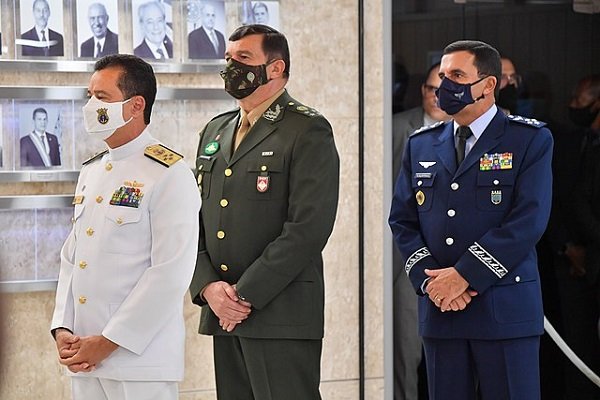This Content Is Only For Subscribers
To unlock this content, subscribe to INTERLIRA Reports.
During the last week of November, O Estado de São Paulo newspaper announced that the Armed Forces commanders were going to leave office before the end of the year so they would not have to salute the newly elected President Lula during the inauguration ceremony. The decision would have been agreed with President Jair Bolsonaro, during one of the commanders’ meetings with the president. According to media sources, it represents the resistance Lula may find in the military against his new term.
Insubordination
According to media sources, in the opinion of a group of former Defense Ministers, the unofficial announcement that Marco Antônio Freire Gomes (Army), Carlos de Almeida Baptista Junior (Air Force) and Almir Garnier (Navy) will leave their commands in the last fortnight of December is equivalent to a declaration of insubordination.
For the former ministers, the military chiefs signaled to the troop that they do not fully accept Lula’s authority. Obviously, this is not a coup, but it sets a dangerous precedent in the lower echelons.
An Attempt to “Break the Ice”
Currently, according to media outlets, the most likely name to become Defense Ministry is José Múcio Monteiro, a former Federal Deputy and former Union Court of Auditors. The politician was included in the transition team and participated in a first meeting on Monday (28/11).
Múcio is seen as skilled by general officers, even though he has no experience in the specifics of the portfolio. The most important thing, in the view of the Armed Force members, is that he is not a root PT like Wagner, one of the PT’s favorites for the post. Thus, the former federal deputy could help bring more stability to Lula’s government.
Differences with the New Government
However, for political commentators, even if Múcio is confirmed by Lula, the relations with the future president will remain shaken. A few factors explain the bad relations between the two parts:
Both the corruption revelations of Operation Lava Jato and the institutional dissatisfaction with the Dilma Rousseff government, which promoted the Truth Commission to investigate the crimes of the 1964 dictatorship without including what the military called the “other side —the actions of the armed resistance against the regime. In addition, there is the alliances promoted by Bolsonaro, and the extensive integration of Armed Forces members to the government, through positions in the public administration. Furthermore, there is the distrust of the high courts, seen as activists, especially the Superior Electoral Court (TSE).
Other Forces
The bad relationship with the newly elected government is not only seen in the Armed Forces. Throughout the last years several incidents showed that the Workers’ Party will probably face obstacles among other security forces, such as the Federal Highway Police (PRF), the Military Polices from several states and even from other groups.
Changes in Attributions
To fight that, the new government may implement changes in the forces, some connected to responsibilities. For instance, the working group on the transition from government to Justice and Public Security will suggest a more restricted role for the Federal Highway Police (PRF), which has been criticized by the opposition for politically acting to support Bolsonaro during the campaign. Investigations targeting the PRF Director Silvinei Vasques are underway.
The assessment is that measures taken throughout the Jair Bolsonaro government allowed the institution to advance in attributions that, originally, would not fall to the police force.




